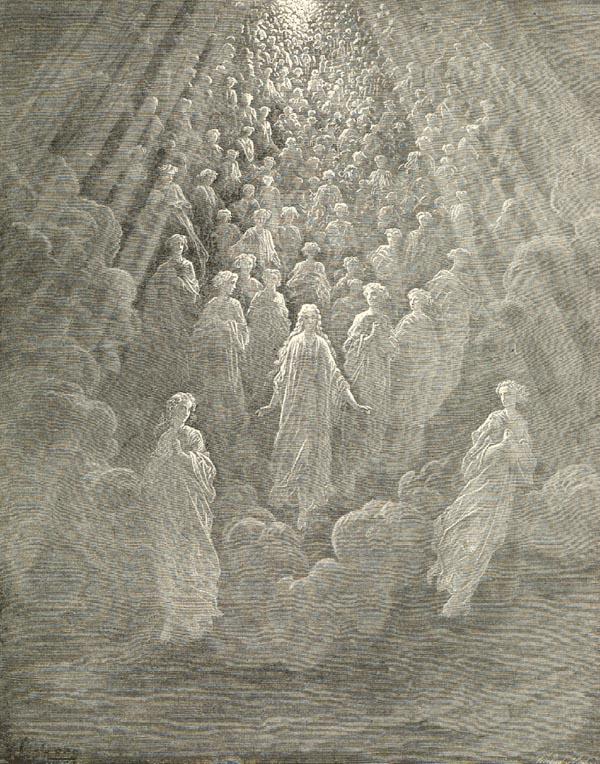We blogged about how congregations aren’t hearing about Hell very much. It turns out, many of them aren’t hearing much about Heaven either.
Mere Orthodoxy is an evangelical ministry devoted to bringing to bear the resources of historic Christianity–particularly historic Protestant orthodoxy– to the problems of the contemporary church. It’s a venture of mostly younger Christians with a reputation of being somewhat cutting edge.
So I was glad to read a post by Mitch East entitled The Gospel Is About Going to Heaven When You Die. The opening refers to a syndrome in evangelicalism that I didn’t realize, Lutheran that I am:
You have heard it said, “The Gospel is not about going to heaven when you die.” Don’t sing about “flying away” when this life is over. Don’t preach about God’s celestial shore or the mansion for His children in the air. These sermons are “escapist” and Christians who listen to them become apathetic about this life, ignore injustice, or shrug their shoulders about the misery of the poor. If we keep preaching this false gospel, the Church will only care about getting to heaven, not doing God’s will on earth as it is in heaven.
East picks up on the reference to the Lord’s prayer, stressing that Jesus Himself is speaking of Heaven as a realm where God’s will is done, in contrast to earth, where God’s will is often not done. He goes on to survey the Biblical texts about Heaven. Yes, there is a physical resurrection of the dead, but there is also a realm immediately after death in which we are with Jesus.
East then launches into an interesting discussions of what we can learn about Heaven from the Apostle’s and the Nicene creeds. He concludes:
All of the hand-wringing about “going to heaven when we die” fails to address the existential question that every mortal will face in this life. We’re all on our way to the grave at one speed or another. Is there a life after death or not? What is it like? Who decides? A preacher, priest, or minister who has no answers to these questions is missing a piece of the gospel.
I suspect, though I may be wrong, that most folks care about heaven and it is their preachers and teachers who are rolling their eyes. Perhaps there are men and women who trust in their careers and health care enough that they can avoid the big questions of life. But most of the human race has lived short, difficult, frustrating, and painful lives. Life outside of Eden has been called “a vale of tears” for a reason. If heaven is real, why not tell parishioners that they can go to a “land where joy shall never end”? . . . .
“Going to heaven when we die” is a message that has helped Christians for millennia. They remind themselves that this life is “just a few more weary days” and then the “shadows of this life” will be behind them. . . .
If ministers preach only heaven, that’s a problem. Preachers need to warn about the possibility of hell, too. If we worry that too much talk about heaven produces apathy, just bring up hell more often!
I’m astonished that this needs to be said, that there are apparently “evangelicals”–that word coming from the word for “Gospel”–that leave out the part about eternal life. So what do they think the Gospel is? Building the kingdom of God on earth? Or what I hear from some Catholics, obeying the Sermon on the Mount?
But that’s Law, and Law of a kind that is even more impossible to follow perfectly than the Ten Commandments. That kind of Gospel can only end in greater despair for anyone who takes it seriously.
Again, one of the Lutheran contributions to “historic Protestant orthodoxy” is the distinction between Law and Gospel. Yes, the Law, but the Gospel is a completely different kind of thing. As the Formula of Concord, summarizing the Scriptural teachings, puts it:
The Gospel is properly such a doctrine as teaches what man who has not observed the Law, and therefore is condemned by it, is to believe, namely, that Christ has expiated and made satisfaction for all sins, and has obtained and acquired for him, without any merit of his [no merit of the sinner intervening], forgiveness of sins, righteousness that avails before God, and eternal life. (Formula of Concord, Epitome, V. 4)
Also, an awareness of eternal life gives us perspective on this life. The problems and sufferings of the moment are not nearly so overwhelming when we consider how little they are in light of eternity. And, ironically, that can help us address the problems and bear the suffering more effectively.
Illustration: Paradiso, Canto 5 by Gustav Doré (1850) via Picryl, Public Domain














